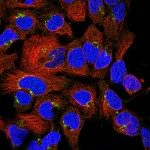Lien vers Pubmed [PMID] – 15695097
Trends Cell Biol. 2005 Feb;15(2):102-11
Prions are defined as infectious agents that comprise only proteins and are responsible for transmissible spongiform encephalopathies (TSEs)–fatal neurodegenerative diseases that affect humans and other mammals and include Creutzfeldt-Jacob disease in humans, scrapie in sheep and bovine spongiform encephalopathy in cattle. Prions have been proposed to arise from the conformational conversion of the cellular prion protein PrP(C) to a misfolded form termed PrP(Sc) that precipitates into aggregates and fibrils. The conversion process might be triggered by interaction of the infectious form with the cellular form or it might result from a mutation in the gene encoding PrP(C). Exactly how and where in the cell the interaction and the conversion of PrP(C) to PrP(Sc) occur, however, remain controversial. Recent studies have shed light on the intracellular trafficking of PrP(C), the role of protein mis-sorting and the cellular factors that are thought to be required for the conformational conversion of prion proteins.

